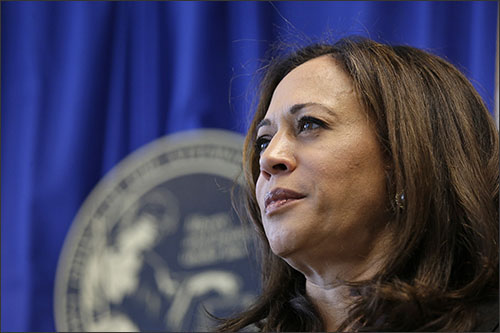K12 Reaches Settlement With Calif. AG, but Acrimony Remains

The oft-criticized online education provider K12 Inc. has reached a settlement agreement with California’s state attorney general, who alleged the company misled parents about the academic record of charter schools it manages and exaggerated enrollment numbers.
Attorney General Kamala D. Harris said the for-profit charter operator, which admitted no wrongdoing, will pay $8.5 million to settle all the claims brought by her office.
The agreement also says that K12 will forgive $160 million of its “accumulated annual balanced budget credits” to the nonprofit schools it manages. The credits are part of financial arrangements the company established with the schools.
In a statement, Harris called the forgiveness of the credits “debt relief” for the schools. Her description drew an angry reaction from K12’s CEO, who said the AG was “flat wrong” about nature of the credits and had “grossly mischaracterized” both the terms of the settlement and the accusations against the company.
In announcing the settlement, Harris said her goal was to ensure that K12 and the 14 schools affiliated with the company, known as the California Virtual Academies, are “held accountable and make much-needed improvements.”
“K-12 and its schools misled parents and the state of California,” Harris said, “by claiming taxpayer dollars for questionable student attendance, misstating student success and parent satisfaction, and loading nonprofit charities with debt.”
In addition, Harris’ office had alleged that K12 and its affiliated schools turned in inflated attendance figures and collected more in state funding than they were entitled to receive.
The AG said one whistleblower had reported to her office that K12 counted students as logging on for one minute a day as a full day of attendance, at a cost absorbed by taxpayers.
Under Harris, an elected Democrat who is currently running for the U.S. Senate, the AG’s office is leading an industry-wide probe of for-profit academic institutions.
As part of the settlement with K12—which has yet to be approved by a California state court—the company agrees to take a number of steps, including ensuring the accuracy of all its promotional materials and training staff on how to record student attendance in its online settings accurately.
But K12, in a testily worded response to the AG’s statement released Friday, said the settlement includes no admission of liability or wrongdoing on its part.
And the company strongly objected to Harris’ depiction of the agreement, and amount of the accord with K12. The headline of the AG’s press release describes it as a “$168.5 Million Settlement.”
“The Attorney General’s claim of $168.5 million in today’s announcement is flat wrong,” K12 CEO Stuart Udell said in a statement. “Despite our full cooperation throughout the process, the office of the attorney general grossly mischaracterized the value of the settlement just as it did with regard to the issues it investigated.”
Another Investigation Kicks Off
Udell said that K12 the budget credits were never accrued on the company’s financial statements, and that the California virtual schools “never incurred financial statement liabilities.”
K12 describes the balance budget credits are “subsidies” that protect the schools against financial uncertainties. The California virtual schools have “not paid that money to K12 and K12 never expected to receive it given California’s funding environment.”
The commercial virtual school operator, which does business across the country and is based in Herndon, Va., has also previously disputed claims that it had reaped funding for students in California who are logged online for as little as one minute. The company said it follows multiple safeguards to track students’ immersion in courses, for the purposes of receiving state funding.
Additionally, the company says that many of the provisions it agreed to in the settlement reinforce improvements that it had already begun implementing at the California Virtual Academies.
But K12 has been on defensive on a number of fronts in California.
State school superintendent Tom Torlakson recently announced that the his department of education had contracted with the state controller’s office to audit the California Virtual Academies.
The superintendent said the probe will focus on a number of areas, including whether the nonprofit California virtual academies are “organizationally separate” for K12, a commercial entity; whether attendance, enrollment and dropout figures are accurate; and whether expenses are tallied accurately.
The department of education is paying the comptroller’s office up to $300,000 for that work.
The California attorney general’s office told Marketplace K-12 that its settlement is separate from the comptroller’s probe and will have no impact on it going forward.
Photo: California state Attorney General Kamala Harris listens to questions during a news conference in June in San Francisco. –Eric Risberg/AP-File
See also:

What’s a comptroller?